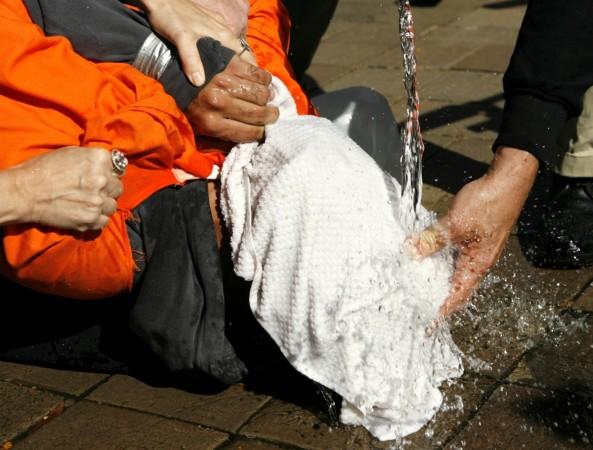
A soon-to-be-made-public report on torture techniques adopted by the CIA on terror suspects following the 9/11 terror attacks highlights extreme forms of interrogation methods under the Bush administration and is feared to earn the US and its representatives a violent backlash.
As the US has put all its embassies on alert ahead of the release of the report by the Senate Intelligence Committee on Tuesday, graphic details about the contents of the report have already emerged, revealing torture tactics such as sexual abuse threats and extreme sleep deprivation.
According to the 480-page summary report, at least one detainee was sexually threatened with a broomstick, sources told Reuters. The actual 6,000 page report will remain classified.
The report also reveals how Al-Qaeda leader Abdel Rahman al Nashiri, suspected of being the mastermind behind the USS Cole bombing in 2000, was threatened abuse with a power drill during interrogation. However, the drill was not used physically on the militant.
In another case, a Palestinian detainee, Aby Zubaydah was kept awake and interrogated for five days without a break for his alleged membership in the Al-Qaeda under Osama bin Laden.
While extreme forms of abuse of detainees, especially in Guantanamo Bay, was publicly known, the new details are expected to trigger anger and possible violence against US interests.
"There are some indications that ... the release of the report could lead to greater risk that is posed to U.S. facilities and individuals all around the world," said White House spokesman Josh Earnest.
The Republicans have opposed the release of the report, questioning the purpose.
However, President Barack Obama defended his government's decision to make the details public stating that "people around the world and people here at home can understand exactly what transpired".
Under the Bush government's crackdown on terror suspects post the September 11, 2001 attacks under the official 'Rendition, Detention and Interrogation' program, torture tactics such as waterboarding were common.
Though the practice has now been abolished, the UN Committee Against Torture had revealed only two weeks ago that the United States is yet to abolish the torture techniques of sleep deprivation, force-feeding and the 'field expedient separation technique,' which aims to prolong the shock of capture by applying goggles or blindfolds and earmuffs to generate a perception of separation.
The committee also highlighted persistent cases of sexual abuse and rapes in prisons, botched executions and even deaths from 'extreme heat exposure' as part of the USA's poor human rights record with regard to prisoners.
















